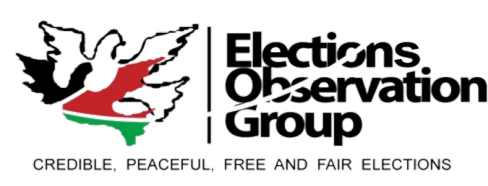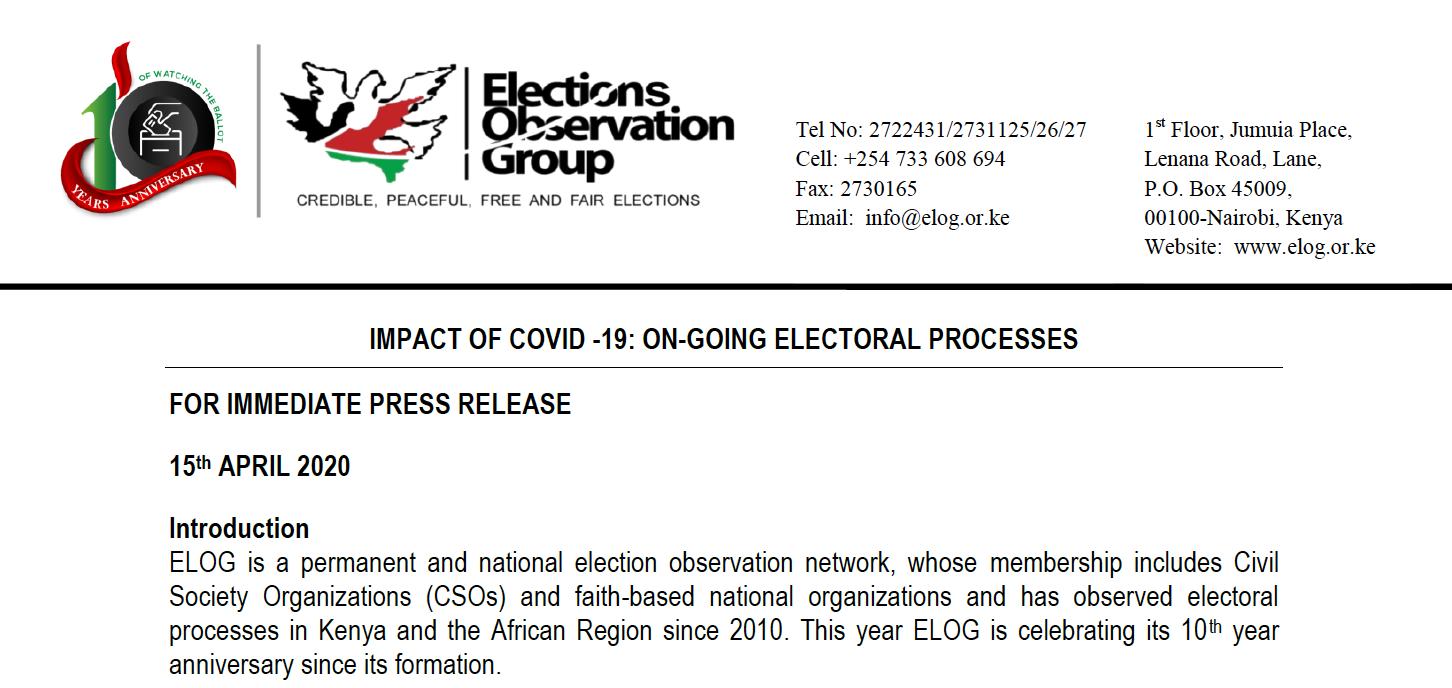Impact of COVID-19 on Ongoing Electoral Processes
FOR IMMEDIATE PRESS RELEASE
15th APRIL 2020
Introduction
ELOG is a permanent and national election observation network, whose membership includes Civil Society Organizations (CSOs) and faith-based national organizations and has observed electoral processes in Kenya and the African Region since 2010. This year ELOG is celebrating its 10th year anniversary since its formation.
Guided by its five key result areas for this electoral period, ELOG has been observing the performance of key electoral actors (namely, IEBC, ORPP, Judiciary, Political Parties, Media and Parliament) and monitoring continuous electoral processes in the country.
We are aware of the unprecedented circumstances occasioned by the COVID-19 pandemic, its global spread and effects on every aspect of social, political, cultural and economic world order. Since Kenya reported its first case on 13th March 2020, the Government of Kenya in a bid to save and protect lives took immediate steps to curb the spread of the disease.
However, some of the measures taken have had a significant effect on a number of other crucial processes including the on-going electoral reforms process that had gained momentum before the outbreak of Covid-19.
ELOG therefore wishes to make the following observations and recommendations:
1. On Electoral Reforms
Electoral reforms had begun in earnest through Parliament, institutional reforms and processes like the Building Bridges Initiative (BBI), the Dialogue Reference Group (DRG) and Punguza Mizigo Initiative (PMI). BBI was working on the completion of the public validation process and was set to develop a Constitutional Amendment Bill that would have been taken to Parliament for deliberation on the next steps. The Dialogue Reference Group had equally developed and published its reform proposals and was engaged in a similar process leading to the development of a reform bill. However, since these processes involved some form of public engagement, they had to be halted because of the effects of COVID-19.
In this regard, ELOG wishes to state that the pandemic will have a significant effect on the timeliness of electoral reforms. If the current processes are not concluded in time for the next elections, the country may be unprepared for the same. ELOG therefore, proposes the following:
i. Both Parliament and IEBC should take a leadership role in reviewing the current situation in order to guide the country on a revised calendar of activities. Under the prevailing circumstances, innovative ways of engaging the public and other stakeholders should be devised.
ii. In light of the impact of COVID-19 on the operations of the initiatives that were championing electoral reforms, there is need for these initiatives to come out and address the public on the status of these processes as well as explore various innovative ways of concluding the processes.
iii. Parliament should use the opportunity to thoroughly discuss and enact the necessary legislations before them to facilitate upcoming processes.
2. On other on-going electoral processes
A number of other electoral processes have been going on in the general electoral cycle. ELOG makes the following commentaries:
a. Boundaries Review
The Constitution of Kenya (CoK) gives the IEBC the mandate to review the names and boundaries of the constituencies at intervals of not less than 8 years and not more than 12 years (Art 89). It also mandates it to review the number, names and boundaries of the wards. The review processes are expected to be completed one year before the general elections. In preparation for the review, the Commission publicly announced that it had prepared the Boundaries Review Operations Plan (BROP), which would provide a roadmap for the exercise.
However, we are concerned that this crucial process is likely not to proceed as had been planned since the Commission lacks both the required funds and the official census data from the Kenya National Bureau of Statistics (KNBS). Furthermore, a crucial legal instrument, the Independent Electoral and Boundaries (Amendment) Bill, 2020 to operationalize the process is yet to be enacted by Parliament. In this regard, therefore:
i. ELOG calls upon the KNBS to urgently share the official census data with the Commission so as to assist with planning and if necessary the execution of the boundary review process.
ii. ELOG calls upon the National Assembly to move with speed to enact the Independent Electoral and Boundaries (Amendment) Bill 2020.
iii. ELOG calls upon Parliament to work closely with the Commission so as to enable the Commission to get the required funds for the exercise.
iv. However, and in light of the present circumstances and the above three points, ELOG urges the IEBC to consider undertaking the review process after the 2022 elections.
b. By-Elections
ELOG has noted vacancies in some electoral areas occasioned by either death of the incumbents, election as speaker as was the case in Kisumu County or nullification as was in the case in Kilifi County. These include the following areas: Msambweni constituency, Wundanyi /Mbale Ward in Taita Taveta County, Kahawa Wendani Ward in Kiambu County, Dabaso Ward in Kilifi County and Kisumu North ward. As a result of the COVID-19, the by-elections that were scheduled in these places were deferred to a later date.
ELOG recognizes that in conducting these elections, large meetings/gatherings would be inevitable during nominations, campaigns and actual polling day processes thus exposing people to dangers of contracting/and or spreading the disease. Unfortunately, these areas remain un-represented, a violation of the voters rights to political representation. ELOG urges that political rights as outlined in the Constitution be protected, promoted and fulfilled at all times even in the face of COVID-19. In this regard, ELOG therefore:
i. Urges the country and stakeholders to start thinking of innovative ways of having the interest of those constituents represented and heard in spite of the present circumstances.
ii. Urges IEBC to start thinking of other innovative ways of voting besides the physical voting. These measures would allow voting to take place remotely. They include electronic voting and postal voting.
c. Voter Registration and Education
The IEBC is mandated to conduct continuous voter registration and education. ELOG is aware that continuous voter registration had been taking place at the IEBC constituency offices before the emergence of COVID-19 cases in Kenya. Similarly, ELOG notes very little civic education has been taking place countrywide with the outbreak of the disease.
We recommend that IEBC regularly shares information with the public on the status of the registration as well as the education including considering innovative ways of conducting the same. Mitigation measures to ensure that rights are not violated should be urgently initiated and where they are already in place, be shared.
d. Political Party Processes
Political parties play a critical role in the electoral processes. Prior to the COVID-19 outbreak, a number of political parties had scheduled internal elections. The Jubilee and Chap Chap Parties had indicated intentions to hold their party elections in the first half of the year.
Accordingly therefore, ELOG urges these political parties to share with the members and the public a communication to this effect and possible timeframes for these activities.
Similarly, ELOG notes that 12 political parties had been issued with interim registration certificates by the ORPP and were in the process of working to acquire their full registration status. With the outbreak of COVID-19, the 180-days requirement to fulfill these requirements for full registration may not be tenable.
ELOG therefore appeals to the ORPP to consider altering these timelines to the extent possible within the Act. At the same time, we recommend that the affected political parties seek alternative ways of meeting the legal requirements such as recruiting members online.
Conclusion
The COVID-19 presents both a serious challenge to the electoral timelines and an opportunity. As indicated above, the challenges are to the effect that a number of processes have been delayed. For this, new timelines will have to be developed. It also presents to the country an opportunity to review the responsiveness of its systems and structures for conducting business, and come up with new and innovative ways of performing crucial activities that can stand similar calamities should they befall the country again.
ELOG is grateful at the manner in which the Government, Ministry of Health and health workers have responded to the outbreak of this disease. It particularly lauds the measures that have been put in place to curb the spread of COVID-19 and urges the members of the public to take these seriously in order to save lives. ELOG also sends out its sincere condolences to those families who have lost their loved ones to this pandemic and wishes those infected a quick recovery.
Stay home, Stay safe and flatten the curve.


